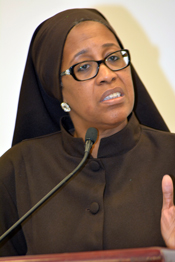Stealing Black children? Houston case a sign of how child protective services is still failing, say advocates
By Jihad Hassan Muhammad -Contributing Editor- | Last updated: May 31, 2017 - 9:22:58 AMWhat's your opinion on this article?

|
“They are operating like it is slavery, when they broke up Black families and sent our children to White families,” Attorney Pamela Muhammad said, blasting Harris County, Texas Child Protective Services, which is part of a state agency.
“They are doing it with the same attitude like they know better than us what is best for our families,” she said.
Standing on the steps of the federal courthouse in Houston on May 23, Atty. Muhammad of the law firm Williams and Associates, representatives of the National Association of Black Social Workers, community organizers, and the Local Organizing Committee for Justice or Else! announced a lawsuit against Child Protective Services in Harris County where the city of Houston is located.
They say Black children and Black families are being robbed of opportunities to care for loved ones, despite kinship care laws. At Final Call press time, the child protection agency had not responded to calls for comment.

Atty. Pamela Muhammad
|
“It has been a nightmare to me,” Ms. Moore said. Ms. Moore’s nephews were taken from her brother by the Harris County agency. The state was aware of Ms. Moore since she has custody of the older of her two nephews, said Atty. Muhammad. The youngest child, she continued, was given to a White family as a foster child, and Ms. Moore was denied due process under kinship laws, which try to place children with family members. The White family refused to return the child to state custody when ordered, instead excuses were made for the family’s non-compliance, said the attorney.
Ms. Moore, who her nephew knows as family, said she was treated with vitriol and insensitivity by the courts and the agency when visiting the child.
“My visitations and interactions with my nephew have been discouraged, belittled and ridiculed. They refused to acknowledge that he was happy just to be around me,” said Ms. Moore.
“This case is really horrendous. Atty. Muhammad’s client was known to the agency years ago. She was an approved adoption resource for both nephews,” said Toni Oliver, president of the National Association of Black Social Workers headquartered in Washington, D.C. She does not see the Houston case as an isolated incident.
“A number of community groups became involved and vocal about the injustice that she was experiencing. A decision was made that the older child would be placed with her, but the younger child would not, keeping the two who are siblings away from each other,” said Ms. Oliver.
Activists said the kinship laws should have given the aunt an opportunity to care for her nephews.
Ms. Oliver described the condition of Black children in child protection systems across the country as bleak. These children are less likely to ever return home, she added.
According to Ms. Oliver, Black children, who are about 13 percent of the population can represent 35 percent to 60 percent of children in the foster care system.
“What we are seeing across the country, and particularly in the state of Texas, is that legislation is not being followed which states that kinship, who are relatives of the children, are not being notified, and are being grossly looked over allowing children to be placed with families that CPS deems qualified, quite often these are White families,” said Ms. Oliver.
The National Association of Black Social Workers said Black children are being removed from their homes more than any other group in the United States.
It is a problem whether the entity involved is family services and courts, child protective services or the foster care system, said the advocates.
Race and social-economic status appear to be a dominant factor in the removal of children from homes, charged activists. The odds are four times greater for Black families, than White families, to have cases that result in the removal of children, they added.
One child welfare study found hospitalized Black and Hispanic children were five times more likely to be evaluated for child abuse, and three times more likely to be reported than White children hospitalized for similar injuries.
Social workers and lawyers working on behalf of Black children say poverty is also a strong predictor of whether Black children will be removed—yet the same fervor to remove children doesn’t exist for poor White and Latino families.

|
“The core of the system does not understand Black culture and life, and see White families as a healthy alternative to misunderstood aspects of our experience,” she said.
Ms. Green added that some social workers negatively report characterizations of mothers and youth. They often refer to Black parents as hostile, cognitively delayed, loud and angry, she said.
In 2005, the disproportionate numbers of Black children in the Texas child protection system was addressed through legislation. A bill was passed to reform the agency and acknowledged race was a factor in some staff decision making, which lead to the removal of Black children from families. The new law included a cultural awareness section which required that agencies “develop and deliver cultural competency training for service delivery staff,” “target recruitment efforts for appropriate foster and adoptive families and diverse staff,” and “partner with community organizations to provide culturally competent services to children and families of every race and ethnicity.”
Atty. Muhammad used a vivid metaphor to describe what happened to her client. “It is as if your children were at school and the next of kin came to pick them up because the parents could not be present, and the school authorities gave your children to strangers,” she said.
Atty. Muhammad called the removal of Black children from homes an epidemic.
“This case represents a trend that occurs with Black children in foster care not being able to be placed with their own relatives,” said Sherri Simmons-Horton.
Ms. Simmons-Horton is a licensed social worker, and doctoral student attending Prairie View A&M University in Texas. Black children in the child protection system are more likely to be placed on psychotropic drugs and declared to have educational problems, she added.
“Financial reimbursement is increased if the children can be declared to have a behavioral problem, so the sicker the child is said to be, the more money the foster parent receives,” explained Ms. Simmons-Horton.
If child protective services are complicit in wrongly removing and adding to problems facing Black children, should help for a child in danger be sought from the agency?
The general consensus from Black social workers and professionals advocating for youth is yes. If there are no family or community alternatives present, children must be made safe, they said. Still, said social workers, Black children get lost in the system too often and advocates for their well-being should to present to help. Organizations like the National Association of Black Social Workers or community groups must be involved, they said. “We can be our own solution,” said Ms. Oliver.
INSIDE STORIES AND REVIEWS
-
-
About Harriett ... and the Negro Hollywood Road Show
By Rabiah Muhammad, Guest Columnist » Full Story -
Skepticism greets Jay-Z, NFL talk of inspiring change
By Bryan 18X Crawford and Richard B. Muhammad The Final Call Newspaper @TheFinalCall » Full Story -
The painful problem of Black girls and suicide
By Charlene Muhammad -National Correspondent- » Full Story -
Exploitation of Innocence - Report: Perceptions, policies hurting Black girls
By Charlene Muhammad -National Correspondent- » Full Story -
Big Ballin: Big ideas fuel a father’s Big Baller Brand and brash business sense
By Bryan Crawford -Contributing Writer- » Full Story






 Click Here Stay Connected!
Click Here Stay Connected!








